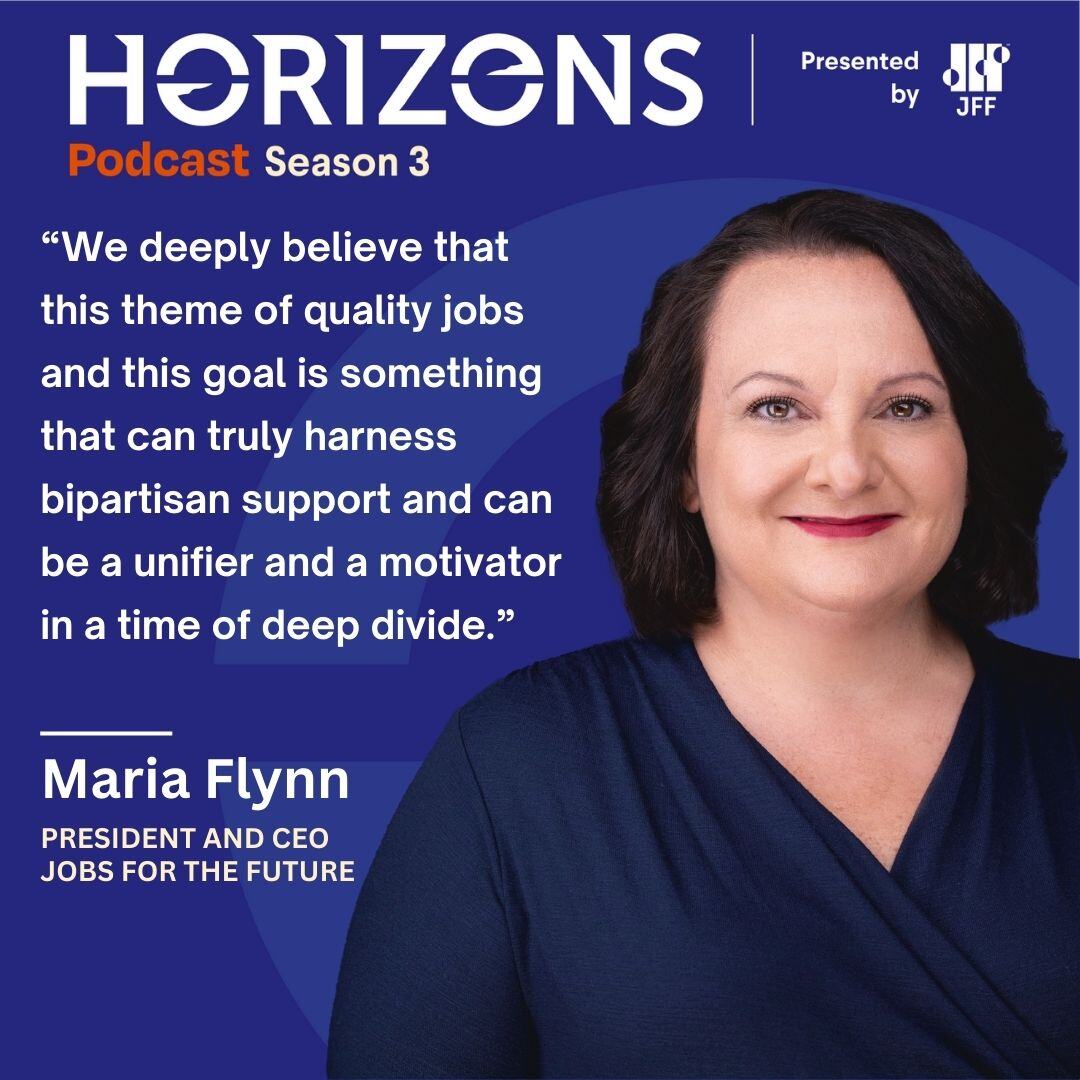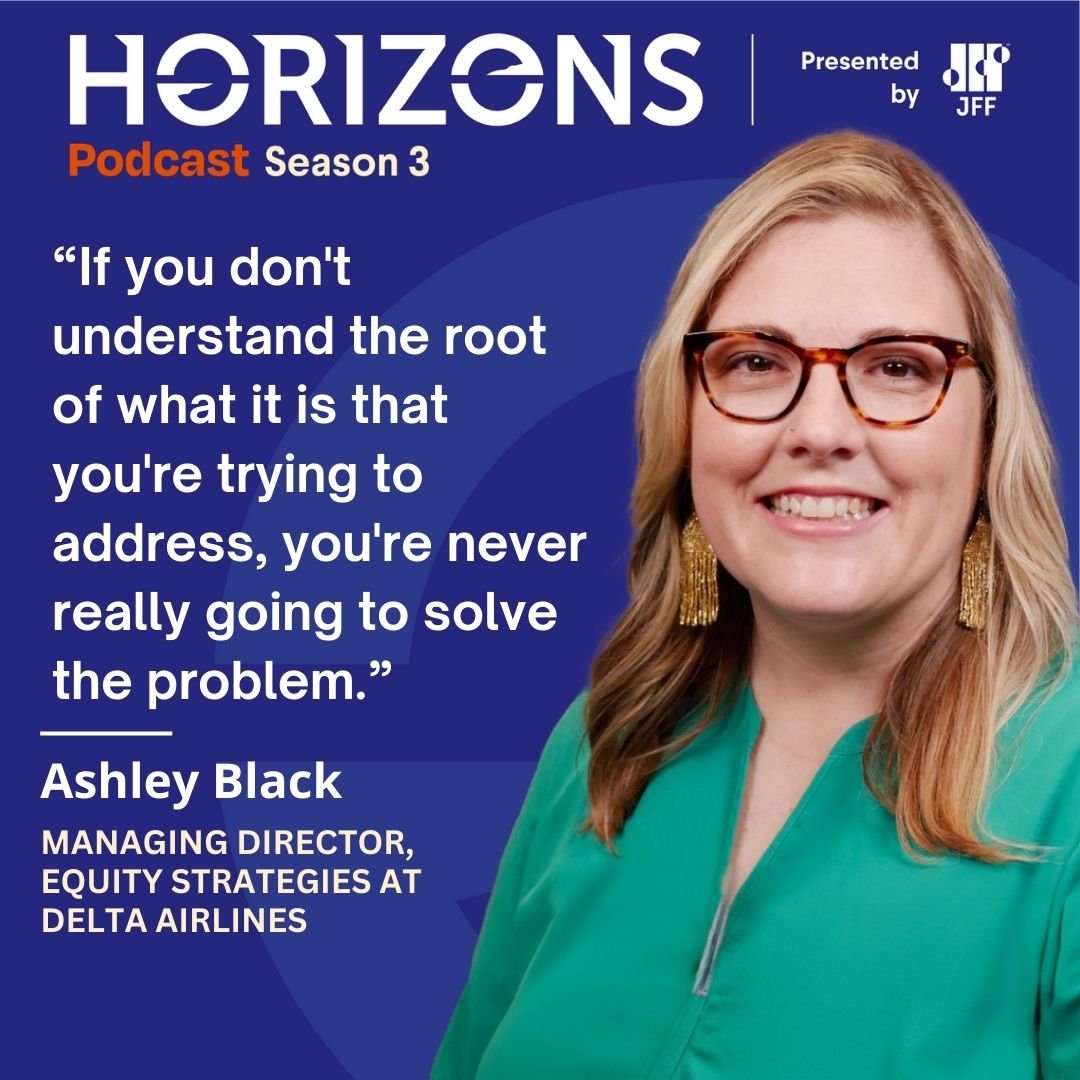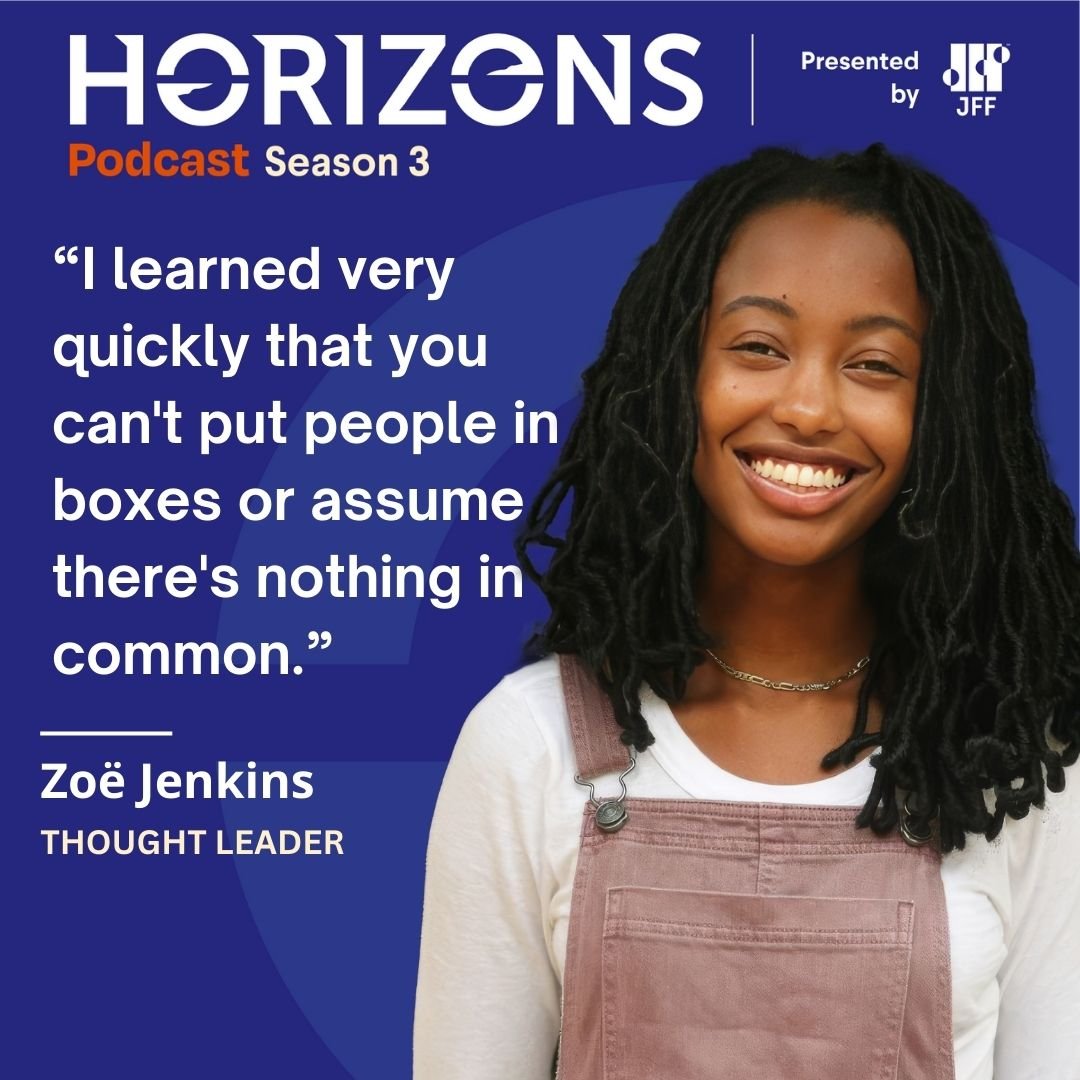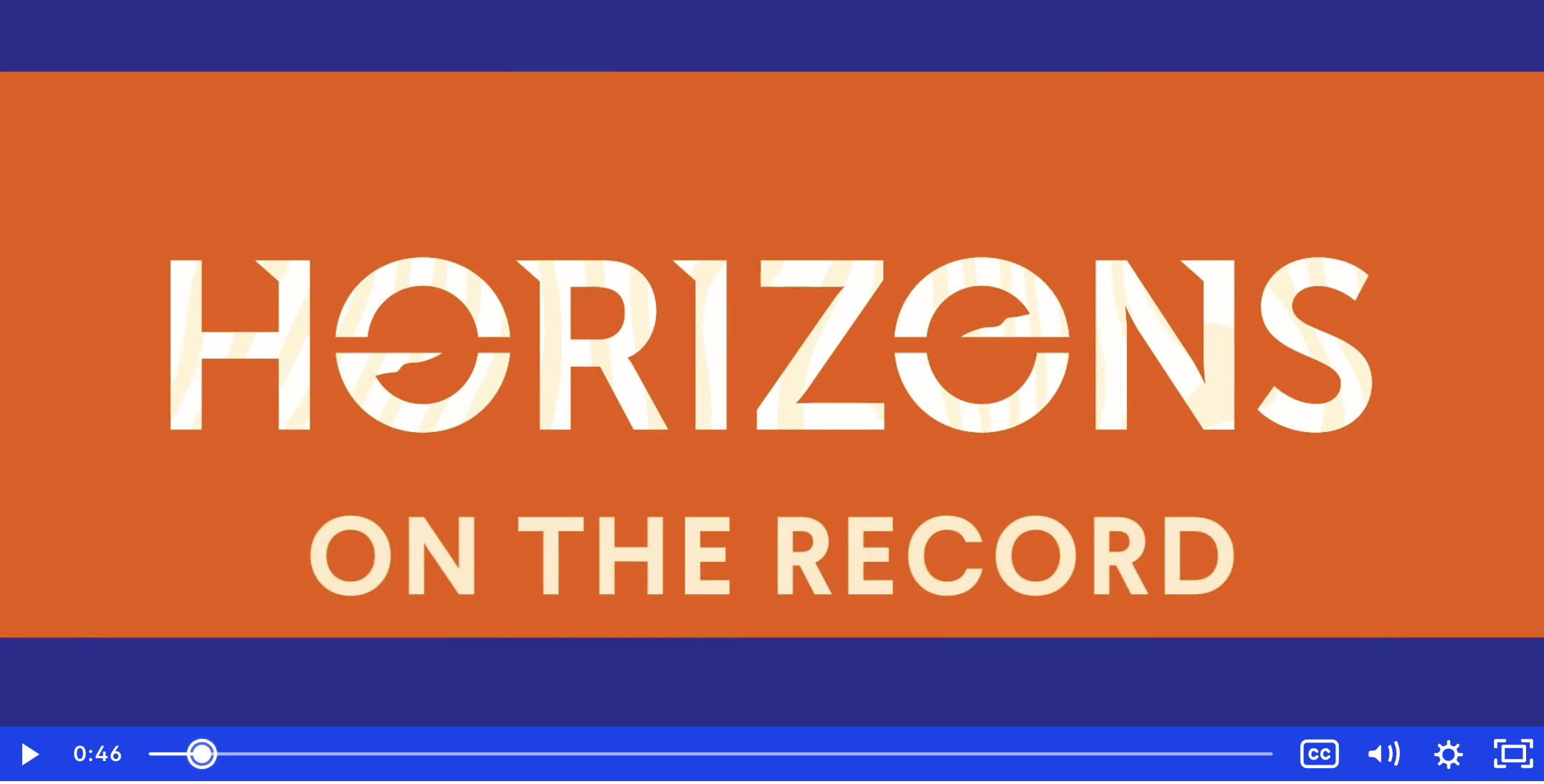It’s time to realize The Power of Us. The theme of this year’s Horizons summit is at the center of this season’s final episode of the Horizons podcast. Jobs for the Future (JFF) President and CEO Maria Flynn joins host Tameshia Bridges Mansfield to preview this summer’s gathering of public and private stakeholders, including some of the biggest names in education, business, activism, and philanthropy. The 2024 Horizons summit will be held July 22-23 in Washington, DC, a strategic choice in this election year to inspire participants to move beyond bipartisanship to discover mission-aligned policy together.
Host: Tameshia Bridges Mansfield, Vice President, Workforce & Regional Economies, JFF
Special Guest: Maria Flynn, President and CEO, JFF
TRANSCRIPT
Horizons podcast – Seasons 3, Episode 6 Maria Flynn
Alex Avila
This is an opportunity for us to make a difference, to be inclusive, to be equitable. I'm here because I believe that there is a possibility we're going to make a difference, and this is definitely going to happen in our lifetime.
Tameshia Bridges Mansfield
That was Alex Avila, a California-based educator. Alex was speaking from JFF Horizons Conference in 2023. He was talking about the collective power at Horizons of bringing key stakeholders from different sectors together around one goal, driving change for the benefit of workers and learners. Well, it's that time again, and as we prepare for Horizons 2024, we are welcoming a very special guest to the studio. Welcome to the Horizons podcast. I'm your host, Tameshia Bridges Mansfield. The theme of this year's Horizons summit is The Power of Us. This gathering of an estimated 2,000 representatives from public and private organizations and institutions is a unique opportunity to examine, influence, and transform America's education and workforce systems. As the biggest names in education, business, activism, and philanthropy make their way to Washington, DC, for the summit July 22 and 23, we are wrapping up this season like we always do by welcoming JFF President and CEO Maria Flynn, to our studios to get a preview of this year's meeting of the minds. Welcome, Maria.
Maria Flynn
Hi, Tameshia. It's great to be here.
Tameshia Bridges Mansfield
It's really good to be here. This is one of my favorite episodes of the season every year, so I'm ready to dive in. So, we typically begin each episode of the Horizons podcast with a selection from the stage at the past year's summit, but we have another tradition with this final episode of the season. This now is our third consecutive year that we will compare notes about what's coming up at the upcoming Horizon summit.
Maria Flynn
Yeah, we have a great agenda lined up for folks with a number of fantastic speakers and great attendees from all across the country. Almost 2,000 of them that'll be joining us in DC.
Tameshia Bridges Mansfield
Yeah, it's going to be really exciting. I'm looking forward to being there. And so, what we did do this episode is we started it with a soundbite from one of last year's attendees, and we chose that soundbite because it really foreshadows this year's Horizons theme, which is The Power of Us. Can you tell us more about the theme and the goals for this year for Horizons and how you hope attendees will be inspired to use their collective power?
Maria Flynn
Yeah, this year we're excited to be holding Horizons in Washington, DC, for the first time, and we intentionally chose this theme of The Power of Us to really focus on this moment in time for our nation and the deep political divides that we are feeling across the country and really taking the time to both step back and raise our gaze and really focus on the North Star that JFF has rolled out over the past year, which is as you know, squarely focused on the idea of moving folks who have been historically underrepresented into quality jobs.
And we deeply believe that this theme of quality jobs and this goal is something that can truly harness bipartisan support and can be a unifier and a motivator in a time of deep divide. So, we are really looking forward to having voices from across the political spectrum that are really focused on the idea of economic advancement and opportunity for workers and learners. Because I truly believe that if we want to see true impact, we need to be building broad coalitions of stakeholders that move us beyond just the traditional voices that have been focused on some of these issues.
Tameshia Bridges Mansfield
I think that's really great, and I'm sure people are missing being in New Orleans, but what I've appreciated in all of the planning and the thought around Horizons being in Washington, DC, is that greater vision and recognizing that we do have a real opportunity right now to bring people to together around a goal that collectively we all I think can agree on, and that hopefully we can get enough people, and actually I know we can because we do it every day in our work focused on not just our North Star, but our greater mission and vision as an organization. One of the other things I want to also touch on is that this is also an election year. Right?
And that was also very intentional in the decision-making that went into Horizons being in DC this year. And what we know is that even though the Horizon summit looked very different in 2020, everything looked different in 2020. And I think it's important to look back at our last election year and the progress that has been made since then. And I would love to hear you talk about what are some of the strides that JFF and our partners have made since 2020 that you think are particularly notable, this year being an election year?
Maria Flynn
Yeah, so as you said, we were very intentional about having Horizons in DC this year being a presidential election year. We also plan on having it in DC again in 2026 to coincide with the next congressional election. We will be back in New Orleans in between for 2025, which is exciting as well. But we really feel that right now we're in a moment where, as you know, there have been unprecedented levels of resources poured into communities across the Bipartisan Infrastructure Act, the Semiconductor Bill, the Inflation Reduction Act. And we're at a moment where communities and states have opportunities to utilize these funds in ways that can truly drive equitable advancement for their workers and their learners. So, we have a moment in time where there has been exciting action at the federal level, and I believe there needs to be more intentional focus on how do we put these resources to work in the most effective and impactful ways.
So, that's going to be a big part of the conversation. I think when we look back to 2020 to now, some of the things that stick out to me are first, just, a truly enhanced and amplified focus on skills. I think that has become a much more frequent and important drumbeat. So, really working across the ecosystem to put skills first. Not saying that degrees aren't important and not saying that skills are the silver bullet, but really, I think the field has embraced this idea and has taken important steps forward to really build a skills first or a skills centered ecosystem. And I think we've seen that both on the employer side as well as the education side and within the public workforce system. I also think that just the advances in artificial intelligence that have taken place in the past four years have surpassed our greatest expectations probably.
So, I think that's an area where the systems that we work with and focus on have I think a lot of catching up to do in some ways, and that there needs to be a lot of intentional thought given about what is the impact of AI as well as how do we best leverage the power of AI in our work. So, those are two big themes that I see looking back across the past four years, and I think as we have made a lot of progress as a field, but I still think there's a lot more that needs to be done.
Tameshia Bridges Mansfield
Yeah, I agree. There is a lot more to be done, but what I am excited about is I looked at the agenda is as you said, there is that balance of recognizing the moment of what this means for folks in local communities. That was really exciting to see on the agenda. And just really tying in that how we think about skills is not just about how do you move employers, but how do you move the entire ecosystem towards skills-based practices. And that's also very much reflected in the agenda and the conversations both on the main stage and also in breakout sessions. So, that's also really exciting to see. I'm interested to hear, Maria, your thoughts on what challenges do you think lay ahead for learners and workers, for educators and employers, no matter who is elected to be our new president this year?
Maria Flynn
Sure, and I was actually reflecting on this a lot last week when I was on vacation with my family in Eastern Tennessee and we were driving a lot through rural communities and reflecting on what learners and workers are probably hoping for and wishing for in those areas. And to me, the common themes really boiled down to find, finance, and flourish, meaning number one, how do we help workers and learners find their path? How do we invest more in transparent, high-quality, equitable career navigation systems? How do we help them finance their path? There's a lot of debate around student loan debt and so forth, which I think is critical, but we need to be looking beyond that to see how do we as a nation truly support workers and learners in their lifelong learning?
And then finally, how do we help workers and learners flourish on their path? Meaning how do we help really promote the use of high-quality wraparound supports and support services to help folks really flourish in their careers? I think too often in this field, we think about placement and employment as the final piece, and I think more and more we really need to be looking at how do we really help the phase post-employment or while they're in employment as being a time to really flourish, and what is the role of both the employer and other players in the ecosystem in making that happen?
Tameshia Bridges Mansfield
I really like that find, finance and flourish because it really speaks to that nothing in helping to reach our North Star is about just one single thing, right? Or one single actor or one single player in this entire ecosystem and space in that it really speaks to what our theme is for Horizons this year that it really is about collective action, collective thinking, brainstorming, visioning, all of it, but that we can't do that in silos, that we have to do it collectively and that we do have to put learners and workers in that conversation. What do you want the attendees to really think about as they're working in this current climate, particularly with so much political uncertainty that's going to lay ahead over the next several months when people leave?
Maria Flynn
We're excited to have on the main stage a number of great conversations. Our first one is going to be between two former secretaries of education, Margaret Spellings, who worked for President Bush and Arne Duncan, who worked for President Obama, who are going to be talking about the importance of bipartisanship and how they have navigated that both in their role as secretary and in their positions that they've held since then. We have Raj Chetty, who's going to be talking about the incredible work that he does around insights around economic opportunity, and conversation with Richard Reeves, who's one of our JFF board members. And we have Ezra Klein, who's going to be in conversation with Jim Shelton from Blue Meridian Partners, who are really going to be reflecting on this election year, this moment we're in, as well as the power of place and the role that community plays in this work.
Tameshia Bridges Mansfield
I think all of those things are really important. One of the things that I appreciate about how we think about our work is on focusing on what those common threads are. And I think that recognition, that bipartisanship can be hard to come by, but there are very real opportunities to focus on bigger visions, bigger pictures, things that we all can align on that helps to move things forward and make really not just our communities, but our country as a whole better for us. Horizons, we've talked a lot about the seriousness of Horizons and why it's in DC, and what we're wanting to energize people to do when we get back home, but it's also really a good time when people are there. People talk a lot about the energy of Horizons and being able to see colleagues that they haven't seen or even make new connections. What specifically are you looking forward to about Horizons this year?
Maria Flynn
Yeah, like you said, I just love the energy of the group being together, and the initial really vision behind Horizons was for it to be a big tent, a very inclusive environment where folks who may typically only go to conferences that are really squarely focused on their direct line of work can come and be part of a broader conversation. One that is really forward-looking and as you said, bold and it's thinking. And as part of that, we have some great kind of events planned. We have an author stage this year where we will be featuring authors who have books that have been released in the past year that are focused on different aspects of economic advancement. We have a podcast stage this year where we will be having folks come and record podcast episodes for their shows live from Horizons.
And we're also going to have a series of candid conversations, which are kind of intimate dialogues between two leaders in a very informal, unscripted way, diving into some interesting topics and a lot of fun thrown in terms of gatherings and community. And one of the things I love the most is hearing folks tell me after Horizons about either business deals they have made or new partnerships that they have forged that really started from folks that they met while at Horizons. So, we like to use the statement or the theme of it started at Horizons to really show the power of the convening and how it can drive new energy and new ideas and new impact.
Tameshia Bridges Mansfield
Well, that's great, and I think you've definitely, throughout this conversation and especially on that last part, helped to bring to life what we see on the webpage in terms of the calendar and everything to light and hopefully, and I think sparked energy for folks. It's definitely giving me things to think about and look forward to as we think about next season of this podcast and what conversations that we can bring people. So, I just want to thank you, Maria, for joining us for this final episode of the podcast. As I said, this is the conversation I always look forward to. It gives me energy for Horizons, and it's always nice to hear what you're thinking about going into Horizons because I know you spend a lot of time working and making sure that what people experience is special and impactful.
Maria Flynn
Great. Well, thank you so much, Tameshia. I will see you soon.
Tameshia Bridges Mansfield
Great. Thank you to our listeners for joining us. We hope to see you at the Horizons 2024 summit. Registration is now closed, so if you cannot be there, some of the key sessions will be available on demand at the end of the summer. And as I said, we look forward to the conversation next season on the podcast. For now, I am your host, Tameshia Bridges Mansfield.






